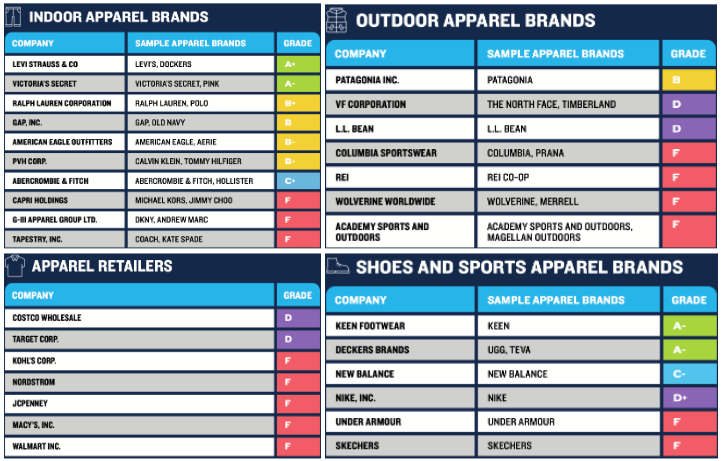Deirdre Cummings
Consumer Program Director, MASSPIRG Education Fund
617-747-4319
[email protected]
Consumer Program Director, MASSPIRG Education Fund
617-747-4319
[email protected]
BOSTON — MASSPIRG, Natural Resources Defense Council, Inc.(NRDC) and Fashion FWD released a scorecard today ranking popular retail and apparel brands on policy commitments to eliminate a dangerous class of toxic “forever chemicals,” known as PFAS, from their products. Levi Strauss & Co. earned the highest marks while Walmart, Costco, Tapestry (parent company for Coach) and GIII Apparel Group (parent company for DKNY and Andrew Marc) received low marks for failing to adopt policies that ban PFAS chemicals or provide up-to-date, publicly available information on any ongoing efforts to phase out these toxic chemicals from their products. They were joined by the Professional Firefighters of Massachusetts, Massachusetts Sierra Club, Clean Water Action, Environment Massachusetts, Conservation Law Foundation, and Seaside Sustainability calling for state reforms.
Since the Massachusetts Department of Environmental Protection set a Maximum Contaminant Level (MCL) for the state’s drinking water that covers 6 PFAS chemicals, one hundred and fifteen public water systems in 77 cities and towns have tested above the new legal limit. Some of those towns include Acton, Bellingham, Burlington, Brockton, Cohasset, Duxbury, Hudson, Hyannis, Mashpee, Natick, Sharon, Stow, Wayland and Westfield.
“PFAS contamination can occur throughout the entire lifecycle of clothing. Manufacturing can result in PFAS contaminating ground water at clothing plants; PFAS can be absorbed though our skin when wearing PFAS treated clothes; and PFAS contaminates our air and water when they are disposed in landfills or incinerated, said Deirdre Cummings, Consumer Program Director for MASSPIRG Education Fund. “To effectively address PFAS contamination, clothing brands must stop using dangerous forever chemicals and replace them with safer alternatives.”
Despite largely catering to a customer base that is concerned about environmental and public health issues, popular outdoor brands, for the most part, received poor grades. REI COOP, Columbia Sportswear (parent company for Columbia and Prana), Wolverine Worldwide (parent company of Wolverine and Merrell) and Academy Sports and Outdoors (parent company for Academy Sports & Outdoors and Magellan Outdoors) received “Fs.” Patagonia Inc. earned a “B,” the highest score in the sector, as the only outdoor brand with a commitment to phase out all PFAS from all its products by 2024.
“We hope this scorecard encourages consumers to use their shopping power for good. Commitments from major apparel brands and retailers, alongside comprehensive policy changes, can significantly help combat PFAS pollution,” said Sujatha Bergen, director of NRDC’s Health Campaigns. “It is especially unacceptable and ironic for the outdoor apparel space to have scored as poorly as they did. We need to hold multibillion dollar outdoor brands like Columbia accountable for exacerbating the PFAS crisis.”

Clint Richmond, Executive Committee member of the Massachusetts Sierra Club added, “Massachusetts is suffering from widespread contamination from PFAS as shown by high levels in drinking water sources across the state. Water-resistant clothing is but one of the many sources of PFAS. We call on the state to take action to immediately eliminate these toxic forever chemicals everywhere it can to protect the health of our residents.”
“Shockingly, high levels of PFAS have also been found in Firefighters’ gear posing a risk to our members, “ said Paul Jacques, Legislative Agent with the Professional Firefighters of Massachusetts. “Working to remove this cancer-causing chemical is one more way to reduce Occupational Cancer in the Fire Service.”
PFAS are a class of over 9,000 toxic chemicals that are used to provide water- and grease-resistant properties to a wide variety of consumer products, including outdoor gear and clothing. Across the United States, PFAS pose a threat to air, water and consumer safety because they are highly mobile and do not break down naturally, resulting in long-term environmental contamination. Exposure to these chemicals, even in small amounts over time, has been linked to serious health effects including kidney and liver disease, developmental issues and cancer.
Many of the organizations also called on state lawmakers to ban the use of harmful toxic PFAS in consumer products, food packaging and firefighter gear.
“The more we look for PFAS, the more we find them. We really need to tackle PFAS at the source by getting these toxic chemicals out of the products we use every day,” said Laura Spark, Senior Policy Advocate, Clean Water Action.
“Many companies fail to label PFAS use in their products as well as use outdated definitions and misleading terminology in their commitments around PFAS that are inconsistent with the majority of the international and scientific communities,” said Alexandra Quinn, founder and CEO of Fashion FWD. “These outdated definitions and lack of labeling can result in consumer confusion around whether the products they purchase contain PFAS and prevent them from making the best choice for themselves, their families, and the environment.”
###
MASSPIRG Education Fund is an independent, non-partisan group that works for consumers and the public interest. Through research, public education and outreach, we serve as counterweights to the influence of powerful special interests that threaten our health, safety or well-being.
NRDC (Natural Resources Defense Council) is an international nonprofit environmental organization with more than 3 million members and online activists. Since 1970, our lawyers, scientists, and other environmental specialists have worked to protect the world’s natural resources, public health, and the environment. NRDC has offices in New York City, Washington, D.C., Los Angeles, San Francisco, Chicago, Bozeman, MT, and Beijing. Visit us at www.nrdc.org and follow us on Twitter @NRDC.
Fashion FWD is a U.S. nonprofit on a mission to eliminate the negative effects on humans and the environment from chemicals used in textile manufacturing by driving better consumer purchases and improved brand practices. We do this through driving consumer education and action. Visit us at www.fashionfwd.org and follow us on Instagram @fashion_FWD to get involved and learn more.